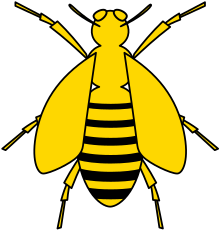
In ancient Egypt the bee was an insignia of kingship associated particularly with Lower Egypt, where there may even have been a Bee King in pre-dynastic times.[1]
Honey bees, signifying immortality and resurrection, were royal emblems of the Merovingians, revived by Napoleon.[2]


A community of honey bees has often been employed by political theorists as a model of human society. This metaphor occurs in Aristotle[3] and Plato;[4] in Virgil[5] and Seneca;[6] in Erasmus[7] and Shakespeare[8] and in Bernard Mandeville's Fable of the Bees, or Private Vices made Public Benefits, which influenced the economists Friedrich Hayek and John Maynard Keynes among others.[9] Tolstoy similarly compares human society to a community of bees in War and Peace.[10] Jean-Baptiste Simon titled his work of apiculture Le gouvernement admirable, ou, la république des abeilles (Paris, 1740).
The motif of the worker bee has been widely used to represent the city of Manchester as a symbol of industry.[11]
- ^ Rice, Michael, Egypt's Making: The Origins of Ancient Egypt 5000-2000 BC, 2nd ed., 2003, p 104.
- ^ Eagle and the bee on the Napoleonic coat of arms
- ^ Aristotle; Jowett, Benjamin (trans.). "Politics". MIT. pp. Book One, Part II. Retrieved 7 January 2017.
Now, that man is more of a political animal than bees or any other gregarious animals is evident.
- ^ Plato. Meno.
Socrates: How fortunate I am, Meno! When I ask you for one virtue, you present me with a swarm of them, which are in your keeping.
- ^ Virgil, Georgics, book IV.
- ^ Seneca. "Moral Letters to Lucilius". pp. Letter 84. On gathering ideas. Retrieved 7 January 2017.
We should follow, men say, the example of the bees, who flit about and cull the flowers that are suitable for producing honey, and then arrange and assort in their cells all that they have brought in
- ^ Erasmus (1974). Collected Works of Erasmus. University of Toronto Press. p. 260. ISBN 978-0-8020-5395-4.
- ^ Shakespeare, William. Henry V. pp. Act 1, Scene 2, lines 210–213.
Obedience; for so work the honeybees, Creatures that by a rule in nature teach The act of order to a peopled kingdom. They have a king and officers of sorts,
- ^ Skousen, Mark (2015). The Big Three in Economics: Adam Smith, Karl Marx, and John Maynard Keynes: Adam Smith, Karl Marx, and John Maynard Keynes. Taylor & Francis. p. 46. ISBN 978-1-317-45820-3.
- ^ Tolstoy, Leo. War and Peace. pp. Chapter 20.
MOSCOW meanwhile was empty. There was still people in the city; a fiftieth part of all the former inhabitants still remained in it, but it was empty. It was deserted as a dying, queenless hive is deserted.
- ^ "The rise of the 'greatest village in England'". Manchester Evening News. menmedia.co.uk. 2012-11-03. Archived from the original on 6 November 2012. Retrieved 2012-11-09.